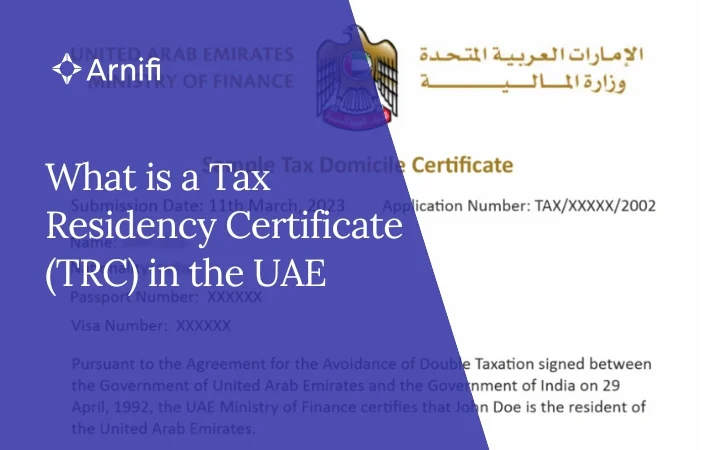Essential 2024 Tax Reforms for GCC Business Owners
by Shethana Oct 18, 2024  7 MIN READ
7 MIN READ

Curious about the new tax reform for GCC Owners? There is no denying in the fact that the new corporate tax law in the UAE brings big changes for businesses.
This law, however, affects how companies figure out and handle their tax duties. It majorly looks at all taxable income from business profits made within the UAE. Businesses need to fully understand what counts as taxable income.
One important part of this law is the tiered tax rate system. If a business has annual taxable profits below AED 375,000, it pays no tax. However, if profits go over this amount, a 9% tax rate applies. This system helps smaller businesses and supports growth in a well-structured way.
Additionally, the corporate tax reforms will affect different areas of a business. This includes how they report finances, how they share profits, and overall tax planning. Businesses should carefully review the new rules, adjust their financial plans, and seek help from experts to meet all requirements and make the most of their tax situations.
Impact of VAT Adjustments on the Service Industry
The service industry plays a big role in the UAE economy. This sector must pay attention to current VAT changes and how they affect prices, recovering input VAT, and ensuring compliance.
The VAT rate in the UAE is 5%. But, companies should stay aware of any future changes that may alter pricing and profits. It is important to keep good records for VAT and know the rules for recovering input VAT. This is key for staying financially stable in the service sector.
Here’s a list of what businesses should think about regarding VAT:
- Check and change pricing to match the current VAT rates.
- Keep detailed records of VAT input and output to make sure reporting is correct.
- Be updated on any new VAT rules or rates from the Federal Tax Authority (FTA).
Navigating New Tax Compliance Measures in the GCC
The tax reforms or changes in the GCC have stricter rules. These rules make businesses change how they handle money and their daily work. They aim to make things clearer. If a business does not follow these rules, it can get fined. This can hurt the company’s image and finances.
Companies in the GCC, especially in the UAE and Saudi Arabia, need to know the specific rules they must follow. This means they should stick to corporate tax deadlines, learn about transfer pricing rules, and set up strong accounting systems to keep everything correct and clear.
Introduction to E-Invoicing Requirements for SMEs
In line with the global shift to digital practices, the GCC region is adopting e-invoicing rules. Saudi Arabia is leading this change by introducing mandatory e-invoicing in stages. This plan aims to make tax administration smoother, improve tax compliance, and lessen the compliance burden on businesses over time.
Small and medium-sized enterprises (SMEs) often work with limited resources. They need to grasp the technical and operational sides of e-invoicing. This means picking the right e-invoicing software that meets standards, linking it with current systems, and training employees on how to use it and understand the new documents needed.
If done correctly, e-invoicing systems can help SMEs by making invoice creation automatic, cutting down on mistakes, and boosting the efficiency of tax compliance processes.
Guidelines for Tax Audits and Penalties for Non-Compliance
Tax authorities in the GCC are getting stricter, especially the FTA in the UAE and ZATCA in Saudi Arabia. They are doing more frequent tax audits and enforcing heavier penalties for failing to comply.
It is important for businesses to know the risks and set up strong risk management steps. This can help them avoid financial troubles and legal issues. Keeping accurate and full financial records, following transfer pricing rules, and fixing any tax filing errors quickly is part of that.
Businesses should learn about the tax audit steps and timelines for their area. Setting up internal controls, doing regular internal audits, and getting expert advice can greatly lower the risk of penalties. This helps maintain a good relationship with the tax authorities.
Strategic Tax Planning for GCC Business Owners
Strategic tax planning is very important for any business that wants to succeed. It needs a forward-looking plan to stay ahead of the changing tax rules in the GCC. When businesses include tax planning in their financial strategy, they are in a better position for safe growth and to follow the rules.
Working with skilled tax professionals who know the details of regional tax laws can help businesses a lot. These experts can help in many ways. They can optimize corporate structures, use available tax incentives, and create a complete plan for tax risk management.
Utilizing Tax Incentives for Sustainable Business Growth
Several countries in the GCC, like the UAE and Saudi Arabia, offer good tax breaks. These are aimed at bringing in foreign investment and helping to grow different parts of the economy. These tax incentives are often specific to certain sectors. They give businesses the chance to lower their tax bills and invest more money into growth projects.
The tax incentives can include lower corporate tax rates for some industries, exemptions on import taxes for raw materials, or tax breaks for the first few years of doing business. By understanding these incentives and planning their business structure well, companies can use their money effectively.
It’s important to remember that these incentives often come with rules to follow and certain conditions. Before making any big decisions, it’s very important to do some research and understand whether these tax breaks apply to your business.
Cross-Border Taxation: Mitigating Risks and Maximizing Benefits
The increasing interconnectedness of global economies demands careful consideration of cross-border taxation issues, particularly in a dynamic region like the GCC. Businesses operating across multiple jurisdictions encounter complex tax regulations, including transfer pricing rules, double taxation treaties, and increasingly, the implications of the global minimum tax.
For instance, the OECD’s BEPS 2.0 project, particularly Pillar Two’s global minimum tax rule, introduces a minimum 15% tax rate for multinational enterprises (MNEs) with global revenues exceeding EUR 750 million. Understanding this complex landscape and its implications for intercompany transactions, profit allocation, and tax residency is paramount for multinational businesses operating within the GCC.
| Key Cross-Border Taxation Considerations | Description |
| Transfer Pricing | Ensure intercompany transactions are conducted at arm’s length and comply with OECD guidelines. |
| Double Taxation Treaties | Leverage applicable treaties to avoid double taxation on income earned in multiple jurisdictions. |
| Global Minimum Tax (Pillar Two) | Assess the impact of the 15% minimum tax rate on consolidated global income for MNEs. |
The 2024 tax reforms in the GCC bring both challenges and chances for business owners. It is important to know the main changes in corporate tax and follow the new rules. Planning your taxes well and using available incentives can help your business succeed in this changing tax world. Also, keep updated on e-invoicing needs and be ready for tax audits to avoid fines. For long-term growth, think about how cross-border taxes may affect you. If you have any questions about how these reforms will affect startups, new VAT rates, or tax exemptions for foreign businesses, talk to our experts for special advice.
Frequently Asked Questions
How do the 2024 tax reforms affect startup businesses in Dubai?
Startups in Dubai enjoy a 0% corporate income tax on profits up to AED 375,000. However, it’s important to get clarity on which exemptions and incentives apply. This will help you plan your finances better.
What are the new VAT rates for businesses in the GCC?
The VAT rate is 5% in the UAE and 15% in Saudi Arabia. It is important to keep up with any changes to these rates and other indirect taxes in the GCC countries.
Can foreign-owned businesses benefit from any tax exemptions?
Yes, businesses from other countries in places like Saudi Arabia can get tax breaks, especially in real estate. However, it is important to check the rules and see who qualifies.
Also Read: Freezone Visa Benefits: A Complete Overview
Top UAE Packages

Related Articles
Top UAE Packages



